Humanitarian Hearing Healthcare: The Unheard Adventures with Nora Stewart | Ep. 176
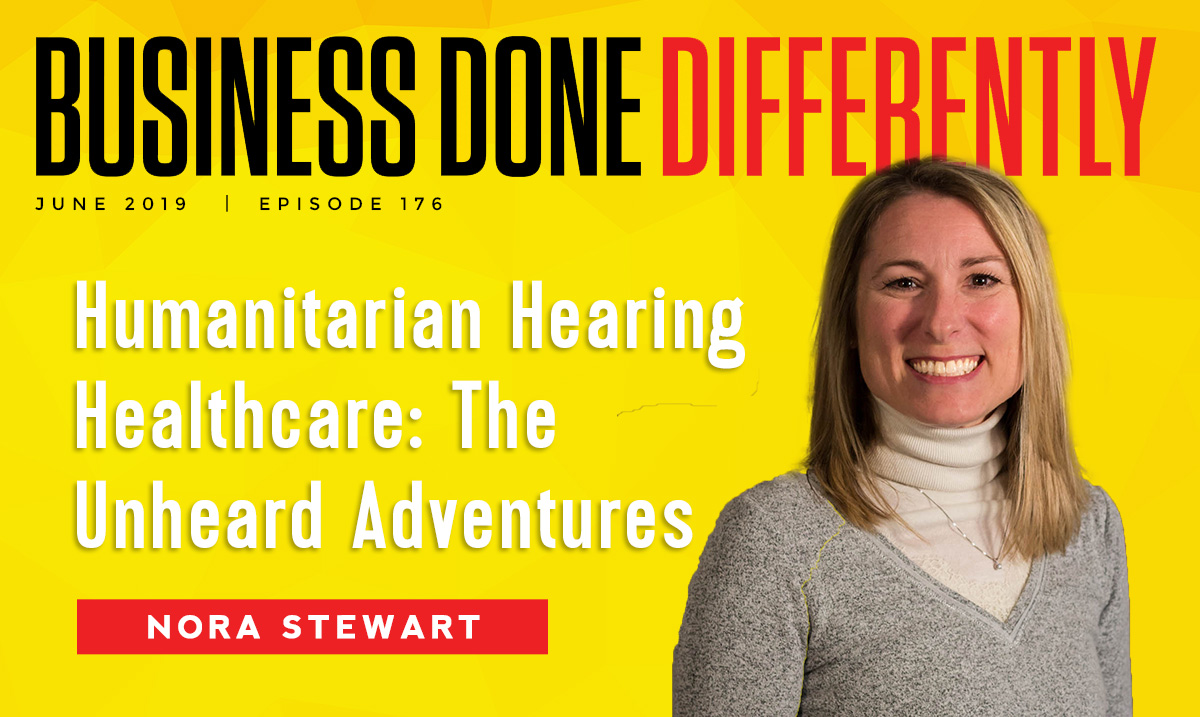
—
Listen to the podcast here:
[smart_track_player url=”https://businessdonedifferently.podbean.com/mf/play/2cym4s/BDD_176_Nora_Stewart.mp3″ title=”Humanitarian Hearing Healthcare: The Unheard Adventures with Nora Stewart | Ep. 176″ artist=”Jesse Cole” image=”https://findyouryellowtux.com/wp-content/uploads/2018/12/jesse_cole.jpg” ]Humanitarian Hearing Healthcare: The Unheard Adventures with Nora Stewart
On this episode, we have a unique guest. Nora Stewart is the Founder of HearCare Audiology along with her husband, Ken. In 2011, they founded GiveHear, a not-for-profit clinic proving hearing assessment and hearing aids for underserved individuals. Since its inception, GiveHear has helped nearly 400 individuals and has inspired more than 4,000 volunteer hours. Nora then started hearing the call after the success of GiveHear to a national and international level. In 2018, Nora was the recipient of The American Academy of Audiology Humanitarian of the Year Award. I had the pleasure of meeting Nora and Ken and an entire group of audiologists from around the country as I spoke at their annual meeting. I walked away inspired at how they are competing in a challenging industry and making a big difference. Nora, welcome to the show.
Thank you, Jesse. I’m excited to be here. I was so excited to have you at our meeting and now I get to be on your show.
I was fired up. You send me this video of what you’re doing around the world and it was so inspiring. I want to get into what you’re doing with your regular care but tell me a little bit about this big difference you’re making around the world.
My husband and I have been audiologist for over many years. It was about several years into being an audiologist that I needed a little bit of a reset button to remember my why. “Why did I even get into the field in the first place?” I signed my husband and myself up for a humanitarian trip, using our talents and our trade. It was the Hearing Humanitarian Trip and on this trip, literally by 2:00 that day, I knew in the most powerful way that this is my purpose even on the whole Earth. It’s why I got into the field of audiology was to not just care about hearing healthcare, but to care about people that had fallen in the gaps and that have no access to the treatment that we are so blessed to get in the United States. It didn’t stop there as I wanted to help these people. It was also the idea that I can inspire more audiologists that are also feeling burned out in their trade by going and giving with no strings attached. It was an idea of, “Look at how many people need our services and look at how many people need to be re-inspired. Let’s marry the two together and see what we can do.”
It was amazing because when I saw the video. It was very evident the purpose that you had and what you’re trying to do and seeing the kids smile. You’re helping kids that can never hear learn how to hear by putting everything in and you’re raising the money. The fundraising and the challenges. I think we need to understand the why of what we do and you had it very clear. You also need to be able to have success with your regular business to be able to do that and to put all those time and hours. I think as I fell in love with what you’re doing with Entheos and this whole non-profit, I started learning about what you guys are doing in your individual practices to have success. I think that’s what the show is all about, it’s looking at your business differently. I’d love for you to share a little bit about the experience at your audiology clinic in Fort Wayne, Indiana.
After we came back transformed from our humanitarian trip, it opened our eyes to start looking at business differently too. What does every single human being on this planet want? I think they want to be heard. Here we are going and giving them the gift of hearing, but in actuality as human beings we want to be heard. We want to be seen. It was this idea of looking at our patients and not just giving them a better hearing, which that’s what we do, but letting them be seen as human beings. The idea that I don’t care what your age or what your trade is, that everybody has something incredible to give the world. We are starting to look at our patients in this light of not what can we give them, but what can they give us that we can share out with more people.
[bctt tweet=”As human beings, we want to be heard and to be seen.” username=””]The idea of, “Why would we make a normal moment for all of the patients coming in and give them what they expected? Let’s give them what they’re not expecting and raise them up.” When they leave, we want every patient excited to come back. That was the goal. Make everybody excited to come back. We had to think outside of the box to give experiences and a hearing aid practice that makes people want to come in and excited to come to see us.
Let’s paint the picture a little bit because everyone is getting disrupted and especially audiologists. There’re opportunities to get hearing aids much cheaper. It’s not the care that you guys give. I know that when we spoke to the workshop, that’s a big issue everyone’s having. Tell me a little bit, what’s this disruption and how are you guys getting around it?
Everybody in any healthcare, the question is it’s so expensive. One way you can address it is to go down the cheap road. A lot of people are looking to say, “How can we make hearing aids cheaper?” From the audiology perspective, if we can make hearing aids cheaper, we can satisfy patients, give them the quality of life and hearing experience they deserve, but cheaper, we would be all about it. Because we’ve been in the field, we know it takes a lot of services and it’s not the reality yet. Until we can make a cheaper hearing aid that can deliver everything that we would want to deliver, we need to focus on the quality of hearing, health care, the experience and raising up people’s hearing through service. The idea was, let’s not fall into all the pressures to bring cheaper because that would cut out a lot of the experience that makes it special. It could also make hearing aid fittings go badly. Part of our business is seeing people that have gone the cheap route and then being able to turn them around because they had no idea how well they actually were capable of hearing with properly fit devices.
Let’s paint the picture a little bit for our audience. I always say, “Whatever’s normal, do the exact opposite.” As you’re coming into your practice, I remember, Ken sharing some of the things that you guys do to make people feel seen and heard. Nora, I think that might be one of the most powerful things that you’ve said is make people feel seen and heard and so many businesses don’t do that. What do you do? When they walk in your doors, what happens?
We have a couple of our teammates that sit at the front desk that knows our patients. For instance, most people are addressed by their first name and actually welcomed into the practice, then it goes from there. We have a coffee cafe and Tamara, who usually is the person welcoming, even knows what coffee or tea our patients like and goes to get it. She makes cookies and usually they’re chocolate chip cookies. We know some patients that they mentioned, “That’s not my favorite cookie.” She puts a little note in their chart. For instance, we have one patient whose favorite is an oatmeal raisin. She sees when he comes in, she comes in and she bakes a batch of oatmeal raisins. These people get me and they care about even simple things like coffee and freshly made cookies.
We also developed our office. We did a redesign. We moved buildings back in 2000 and we took a survey of our patients. What’s one of your favorite hobbies? Golf and being in Indiana came up over and over again. One of our waiting areas, we have two different areas. One of them has a mini putt-putt area. We thought, “Patients get a kick out of this.” Some even bring in their own putters. What has happened and makes me just so happy is some of our patients are bringing their grandkids to the appointment. They play mini putt-putt with their grandkids. That’s what we always wanted to do. It’s not about better hearing, it’s about reconnecting with your world because we improved your communication. That is probably one of the best reports I’ve ever heard is our patients bringing grandkids and to play mini putt-putts.
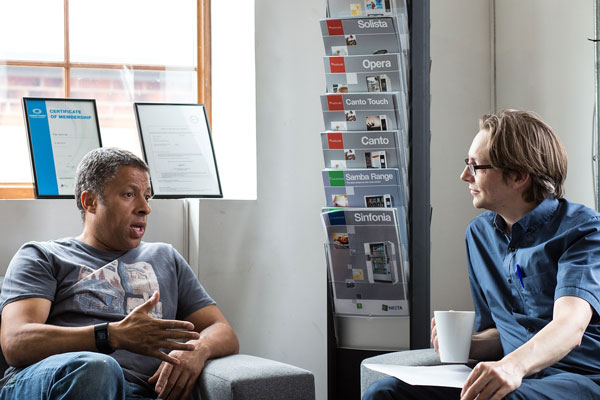
It’s bringing people together. At the stadium, that’s a big thing we try to do is bring families together. How many people would ever think that an audiologist, a dentist or a doctor brings our families together on the check-ups. It’s fascinating. I think what you said, you listen carefully and you think about oatmeal raisin cookies, you make notes. You pay attention to what your customers love and so few people do that. You’ve nailed the first impression. I’ve heard some other things too. Massage chair, tell me more about these details either what you’re doing or some of the other audiologists as part of the practice that you work with.
One of the things you said is, “What’s ordinary, do the opposite.” What’s ordinary at a lot of medical practices or hearing aid practices are wait times and people hate to wait. We thought, “What can we do to fill that wait time?” If we know they have to wait, let’s make it an enjoyable wait. The golf, the little mini putt-putt was one idea. Another idea we had is let’s get a massage chair in here. All the time we hear, “No, don’t worry about the wait. I’m fine,” because they get to have an experience in a massage chair. We’ve even had patients, when they book their appointment, call in and ask to book it 30 minutes earlier so they can have massage chair times before their actual appointment. Again, take what people don’t like about coming into private practice and flip it to find something that they would look forward to. That was certainly the idea of the massage chair.
One last thing that I think is brilliant that our practice does and we are sharing it out with our group of audiologists around the country, came very organically in grassroots through a team meeting that we had here. It wasn’t like it came down this directive from the top to the staff and say, “Do this.” It was the brainstorming of what can we do to appreciate our patients and to realize that everybody has something to give. The idea that came from that was this idea of what we call a wisdom book. We have little books in our waiting room and we ask our patients to write down a piece of wisdom that they carry with them, that they would want to share with the other patients coming in. One of them that I found to be the best piece of wisdom is he said, “Life is like a roll of toilet paper. The closer you get to the end, the faster it goes.” At first, it’s pretty funny but then you think it strikes you how true that is. There’re these little pieces of wisdom shared by patients that have so much to give. This book honors them.
It’s fascinating because you’re making the customer the hero and so few businesses do that. Actually, it’s a patient’s wisdom. It’s not about you and you even said you might even publish this book at some time.
I hope to publish this. We’re talking about it with our team. We even had the idea that we can take one of these bits of wisdom and make it weekly wisdom. Every patient that comes in, we’ll give them a little a piece of paper with the weekly wisdom on it with the patient’s name to honor the patient that it came from, if the patient wants their name to be broadcasted. Most people say, “Yeah, share it.”
I think it goes so much to say about knowing your customers and loving your customers because that’s the reality. Generally, these patients are older, which means they probably have tons of wisdom that we all can learn from, yet few people are asking them about life advice and wisdom. Yet they have so much to give and you’re giving that platform. What if every business thought, “How do you make the customer the hero?” Let them share some of the lessons they’ve learned and feel purpose in what they’re doing. They feel purpose in going to the audiologist. They’re like, “Not only am I getting my hearing but I’m helping other people.” How did that idea come about? Was it the team meeting?
[bctt tweet=”Life is like a roll of toilet paper. The closer you get to the end, the faster it goes.” username=””]It was at the team meeting. I wish I could claim it or I wish Ken could claim it, but actually I don’t. It was showing the brilliance within our team. This is because we were talking about one of our favorite things about the patients is when we can slow down and listen to them. Again, it wasn’t our idea. It was seeing our people, our staff for what they can give and their ideas and that’s how this was born.
I could talk about this stuff forever because I think if you start on the friction points, which you did, the wait times, how people come in and then also say, “What would be really special? What would give them meaning in what they’re doing?” We have ideapaloozas. We bring our whole staff together and talk about these ideas. It’s solely focused on the customer experience. I’d be intrigued because you’re doing this, you’re mapping out, what are some other moments, because it sounds like you’ve nailed the first impression. I’m blown away either from you or other groups that you’ve worked with. Some of the things, either during the session, after the session or when they leave. What are some really cool practices you’re doing?
I have a practice owner that has a birdcage and keeps two birds in their office because usually when their hearing is starting to decrease, it’s in the high pitches. The lovely bird songs go away first. It’s such a joyful thing to hear bird songs. In fact, there’s somebody that says it even is rooted deeper psychologically, when you hear birds, you feel peaceful because birds only sing when it’s safe outside. There’s real security rooted in hearing the birds. They have a bird cage right in their office. The patient’s first experience can hear one of the most pleasant sounds to hear. We have another patient, actually, another couple of audiologists that we’re close with that know the power of music.
One of them has a little piano in their waiting room and invite their patients to sit down and play music when they’re waiting. Music is so joyful. It hits that emotional button of all the patients, but then again it does make the patient the hero. They’re inviting the hero to share their musical talents. Other audiologists bring their ukulele to the office and she sings to patients once they get fit with hearing aids. She said that she’d gotten quite a few smiles and quite a few joyful tears. That’s really the goal. We say, “Let’s make people laugh and cry. We’re having a good day if we can do both,” and happy tears, not sad tears.
I’ve talked about that and it’s one thing that happens at a ballpark, which you never think. People are so excited, so emotional when they get to meet the players, connect and have these really special moments. I love it. Other friction points, it’s a big expense, then they leave, how do you or other groups stay in touch because this is something that many businesses fail at. They have the experience, they come in and they’re wowed by this first impression. They get taken care of and then they’re gone. What are some things you or other groups have done?
We and a lot of the groups that we talked to, in fact we’re looking at what is best practice for that, because that’s really important. Surveying audiologists from around the country, we’re getting everybody’s ideas. We always have a within a 24-hour call that we call the patient and we touch base and say, “How is it going?” At least the audiologist that we work for, within one week, we see them back. We talk about their experiences. It really isn’t a one and done. When you go back to cheap hearing aids that usually is more of, “You’re fit. Now, go through life.” Truly, one of the reasons that don’t work is because hearing aids need service too. We schedule them back at least every six months to come in for routine maintenance. Again, that’s when we really get to delight them because we heard about them and we know their preferences. It gives us that opportunity to keep making them feel special, which because they are.
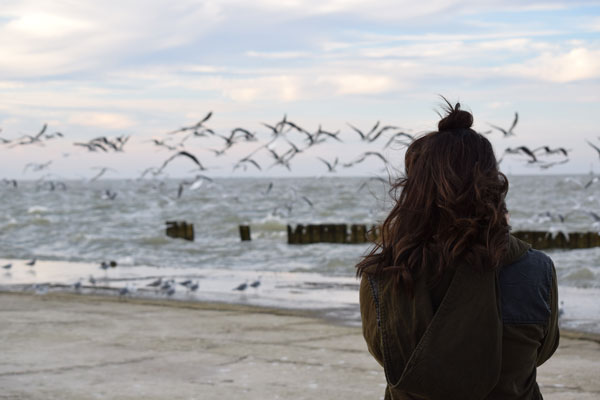
When I was speaking, one audiologist mentioned that on their anniversary of getting their hearing aid, they get a thank you card and it’s like an anniversary card. It’s not just a birthday card, it’s the anniversary of when they improve their hearing. Think about that in your business, whatever business you’re in. The first time they experience you, it’s a restaurant. For us, it’s a game. What if a year from there, they got a card? Talking about listen carefully and paying attention, that’s a surprise. A lot of people get Christmas cards, a lot of people get birthday notes, but it’s something that’s actually celebrated first and that fascinated me as well. Have you seen any other things that are unique in the experience or things that you’re trying to add to your customers’ experience?
One of the things that we have become involved in is this whole idea of giving back and giving to people that can’t afford hearing healthcare. There are a lot of practices, and ourselves included, that if somebody decides to trade up, get better technology with their old hearing aids, we can recondition them, fit them on somebody that couldn’t have afforded that. Some people have taken that the extra mile and gotten the person’s story that was fit with those hearing aids. All their gratefulness from them and their experiences and then share that with the person that donated those hearing aids. I don’t know how you get more meaningful than that. It’s important that you hear well and you help your hearing, but then at the same time, that audiologist has gone the extra step to let them know what their older technology has done to improve somebody else’s life.
A little bit on that purpose-based I think to get meaning and a purpose and obviously starting this non-profit. You could tell how passionate you are spending time with you and everyone else that’s helping out. I’d love for you to share a little bit about the power of the story. I know some of the videos that you’ve posted showing the kids and the first time they can hear and the smiles, hearing smiles as you’re saying, share with me how you guys came about that and how that’s made an impact and sharing the stories of the people that are being impacted.
That’s been a long journey for us, but everybody has a story. Thank goodness for most of our stories here in the US, our stories can be very different from some of the stories of people around the world who live in very different circumstances. Part of that story is there are people in situations that I can’t even imagine even having access to hearing healthcare. They are struggling to have access to have clean water or education. Some of our stories that had really impacted me oftentimes have to do with children, when we go around the world and we fit children with hearing aids. Here we address disabilities and start to address them from early ages, but I have so many stories of children that were maybe ten or eleven and literally suffered physical abuse.
They couldn’t go to school. They were put in fields and it’s because they couldn’t hear very well. When we fit them with hearing aids and because we follow up, not just here in our local practices, but wherever we go around the world, we follow up. These children’s lives have been transformed. They’re back in school. They’re starting to learn. It literally is the difference between the one child called himself a slave to being able to be in school and have a chance, have an opportunity at a better life. Hearing is so important when we want to make human connections. Sometimes you almost have to go to the worst of situations and observe the worst to then see the best of the situations and appreciate what we have access to here in the United States.
I think you’ve embraced that and understand that these stories are so important to share. Because the more you share, the more people understand what you’re doing and the impact you’re having because they don’t feel it. You can feel the idea of a child being in those terrible conditions. You started doing videos. I believe every company should share these stories to get people a part of it. Have any other stories really inspired you?
[bctt tweet=”It’s so easy as humans to know what we don’t like. It’s harder to pinpoint what we do like.” username=””]There are so many inspiring stories. We don’t stop at the patients in the other communities. The whole idea is about everybody has something of value to give. When we go to these areas and help patients, we start looking for immediately who else in that community is the leader that we can train and teach so they can get sustainable care there. We only go once every six months or every year, but who locally can we raise up and train and teach, so that they have an opportunity for a job. They have an opportunity to help these people receive healthcare all the time. One of my most inspiring stories is of a gentleman named Sammy. When we started going to Zambia five years ago, he started as our driver. Through getting to know him throughout the week, he shared his passion for raising up people and changing people’s mindsets that they can do more, they can be better.
We started looking at him and every time we would go there, we would pull him into the clinic and start training him how to clean the hearing aids and how to look in the ears. We had him actually come to the United States and he trained under five of our different audiology practices around the states and then even went to a hearing aid manufacturer and trained in their repair lab. Now he’s back in Zambia and through Hearing the Call, our non-profit, we have donors that he is now employed and has a job. He is creating sustainable hearing healthcare. Who else to love their people than the people right in their own community? That’s probably been one of my favorite stories of success since starting this.
You are making a huge difference. I want to finish with some rapid fire questions. There’s so much said about nailing the first impressions, nailing the experience that you provide and then understanding the stories and sharing those. Those stories are what gravitated me towards you. It fired me up in what you’re doing. I’ve been grilling you with some questions, Nora. You get to grill me now. Flip the script. You’re now the host. You get one question.
Jesse, if you were sitting at our front desk and welcoming a patient in, how would you welcome a patient?
It depends on what your brand theme is. We’re starting to challenge companies to say, “If you’re a magazine, what type of magazine would you be? Are you Rolling Stone or your GQ or are you a fun magazine? If you’re a TV show, what type of TV show are you trying to be? Are you a fun TV show? Are you really a very nice, upscale TV show? Who’s the character?” It really depends on the theme. You know me, I get excited over fun. I love the fact that you have putting greens and massage chairs because if that’s your theme, then you think of every single thing that you could do that’s fun. Everything that’s unique. What surprises? Could you have under a chair a surprise and a free gift or that sort of thing? What type of things can you surprise your customers to provide fun?
When they get there at a certain amount of time, could there be confetti? Could there be a celebration because it’s their ten-year anniversary? All those different things I would think that fits your brand theme. The first impression is wild, but the first impression happens before they show up. It’s, “What would that first time they go on the website and the call?” Again, knowing your brand theme first I think is the key. We’re going to move on. I love the question time. If you want better answers in business, you need to ask better questions. You’re running this big group, you’re working with lots of people, what are questions you’re asking to try to get better and improve your experience?
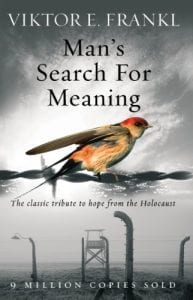
We have this idea of flip it. What is the biggest pain point in your life? We really look at that pain point and say, “Now how would we flip it?” It’s the whole idea that every challenge could be a great opportunity. A lot of our questions really do revolve around on what don’t you like? Because it’s so easy, for some reason, as humans to really pinpoint what we don’t like. It’s harder to pinpoint what we do like. A lot of our questions are what don’t you like? I think for us, it’s asking why about five times, but why don’t you like it? They say, “Why and why?” I think you get down to the core, but it’s by asking why over and over.
I know you’re a big learner, you listen to a lot of podcasts. That’s how we got connected. Also, you’re a big reader. You share a lot of books with the whole group. What are some books that stand out for you?
One of the books that I share with a lot of people is Man’s Search for Meaning by Viktor Frankl. That was just one of those books that I don’t know how you can read it and not be completely transformed. Way back when, when my whole journey of learning and reading was The 7 Habits of Effective People. It’s a classic. There’s so much knowledge in every book. I have so many and now there are all flooding into my mind, but those were two transformative books for me.
What’s one thing that you’ve done to stand out in business and in life?
I think one thing that I’ve done that I would say that stood out the most was to start a non-profit. The idea of I don’t know about that’s going to do to our private practice, but I see the gap need and I see the need of people needing quality hearing healthcare. It was stepping out of my comfort zone of what I thought was my comfort zone and being in the private practice, into a business world I didn’t understand or didn’t know, but I was willing to learn because the need was so great.
You start it and once you do something, that’s when you learn. Do it and then learn. What some of the best advice you’ve received?
[bctt tweet=”Anytime you’re feeling nervous, don’t focus on what you’re going to look like or sound like. Focus on how you make people feel.” username=””]The best advice. The best advice is anytime you’re feeling nervous, even about an interview like this, is you don’t focus on what you’re going to look like or sound like. You focus on how you make people feel. I try to carry that through everything we’ve done, through our private practice and through the non-profit. They say, “They’ll forget what you say, they’ll forget what you do, but they’ll never forget how you make them feel.” The advice to see people and look for what’s great about them. You forget about yourself and all of a sudden, you find yourself liking so many people and learning from so many people because you’re open, because you see what they have to give.
How do you want to be remembered?
I want to be remembered as somebody that did everything she could do to love her neighbor.
I’ll tell you, Nora, since I first met you and spoke to your group, I’ve been blown away. You talk about how you make people feel. I was so welcome to speak to your group. You send emails after telling about the impact of my book and of speaking. You are living that and I’ll tell you, I’m so blown away by what you guys are doing. I left inspired. You’re growing, learning, helping people and I’d love for people to know how can they learn more from you, connect with what you guys are doing and share more of this.
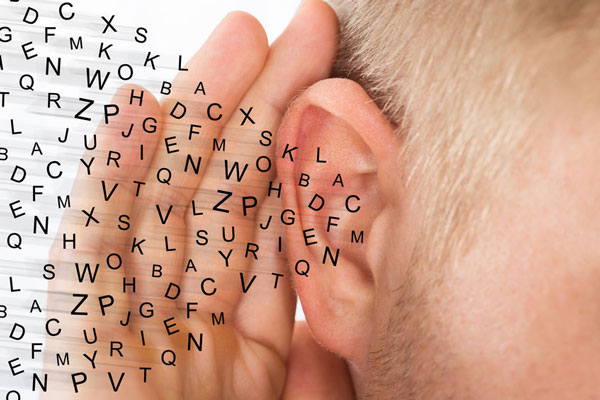
Thank you, Jesse. This has been such a pleasure and I am so glad I got to meet you in person. I heard you on a podcast and thought, “I need to meet him because I can learn from him.” This has been awesome.
To find out more about your not-for-profit, what’s the website?
That is www.HearingTheCall.org.
Go to their website to find out more and see if you can help and volunteer and learn more from you guys. There’s a lot to learn. You are a practitioner. Nora, thank you so much.
Thank you.
Important Links:
- HearCare Audiology
- GiveHear
- Hearing Humanitarian Trip
- Entheos
- Hearing the Call
- Man’s Search for Meaning
- The 7 Habits of Effective People
- www.HearingTheCall.org
About Nora Stewart
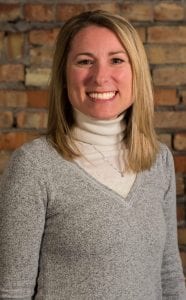
With the help of many tremendous people, she founded HearCare Connection, a local not-for-profit hearing center in her community. It created a way to help anyone desiring better hearing receive it and to ensure that no person would be prevented from participating fully in life due to hearing loss.
In three years since incorporating the give-as-you-go business model, her private practice has been uplifted and everyone in the practice is benefiting from an inspired culture, reduced marketing budget and double-digit growth in sales.
Love the show? Subscribe, rate, review, and share!
Join the Business Done Differently community today:
